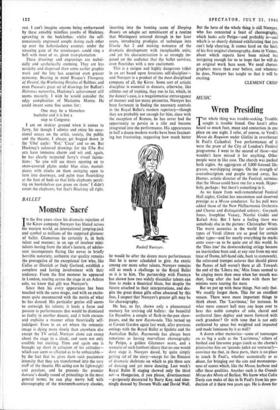Monstre Sacra
BALLET
Since then his every appearance has been touched with the same magic, and with an excite- ment quite unconnected with the merits of what he has danced. His particular genius still seems to outweigh his talents; it lends a force and passion to performances that would be dismissed as faulty in another dancer, and it both excuses and explains a manner often theatrically self- indulgent. Even in an art where the romantic image is dying more slowly than anywhere else except the TV serial, Nureyev alone can sweep about the stage in a cloak, and seem not only credible but exciting. Time and again one is brought up short in criticism of his attitudes— which can seem so affected as to be unbearable— by the fact that he gives them such passionate intensity that they are transformed into the very stuff of the theatre. His acting can be lightweight and petulant, and he presents the premier danseur's deadly round of princelings in the most general terms; he can play merry hell with choreography of the nineteenth-century classics, inserting into the hunting scene of Sleeping Beauty an adagio act reminiscent of a routine that Mistinguett tottered through in her later years, introducing prodigies of technique into Giselle Act 2 and making nonsense of the dramatic development with inexplicable exits; and yet his characterisation is so strongly im- posed on the audience that the ballet survives, even flourishes with a new excitement.
This is a unique and highly dangerous talent in an art based upon ferocious self-discipline— and Nureyev is a product of the most disciplined company of all, the Kirov. Some sort of artistic discipline is essential to dancers, otherwise, like athletes out of training, they run to fat, which, in the dancer's case, is a megalomaniac extravagance of manner and too many pirouettes. Nureyev has been fortunate in finding the necessary controls in the Royal Ballet's modern repertory—though they are probably not enough for him, since with the exception of Romeo, he has never had the opportunity to persist in a role and become integrated into the performance. His appearances in half a dozen modern works have been fascinat- ing but frustrating, suggesting how much better Rudolf Nureyev.
he would be after the dozen more performances that he is never scheduled to give. An exotic among our more sober talents, Nureyev remains still as much a challenge to the Royal Ballet as it is to him. The partnership with Fonteyn has shown how two widely dissimilar talents can fuse to make a theatrical blaze, but despite the furore attached to their interpretations, and des- pite the great dance gifts often obscured by this fuss, I suspect that Nureyev's greater gift may be for choreography.
He has, so far, shown only a phenomenal memory for reviving old ballets : the beautiful La Bayadere, a couple of flash-in-the-pan show- pieces, and the new Raymonda. This turned up at Covent Garden again last week, after previous outings with the Royal Ballet at Spoleto and the Australian Ballet. Raymonda has always been notorious as having marvellous choreography' by Petipa, a golden Glazunov score, and a scenario of such lambent idiocy that no one would dare stage it. Nureyev dared, by quite simply getting rid of the story—except for the flimsiest of dramatic skeletons on which to pin three acts of dancing and yet more dancing. Last week's Royal Ballet II staging showed only the third aot—a Hungarian, if you please, divertissement —gorgeously decorated by Barry Kay, and stun- ningly danced by Doreen Wells and David Wan. But the hero of the whole thing is still Nureyev, who has concocted a feast of choreography, which looks echt Petipa—and probably is—and which is so sheerly damned exhilarating that you can't help cheering. It comes hard on the heels of his first original choreography, done in Vienna, about which -reports have been mixed but intriguing enough for us to hope that he will do an original work here soon. We need choreo- graphers more than ever before, and whatever he does, Nureyev has taught us that it will be exciting.
CLEMENT CRISP






































 Previous page
Previous page